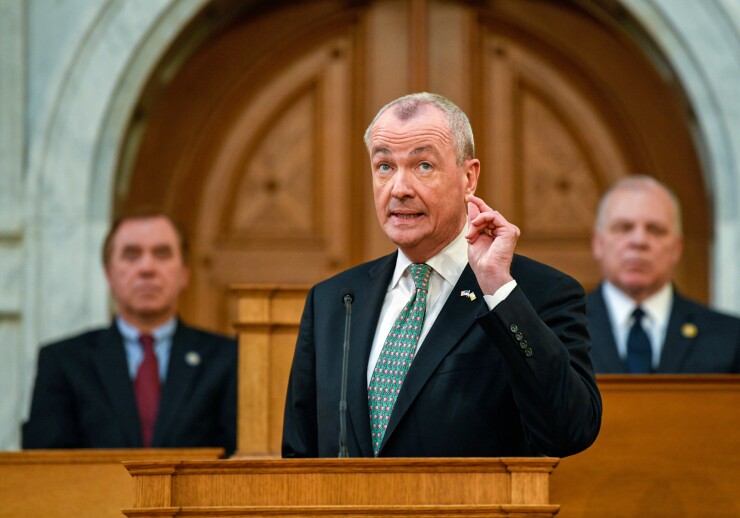New Jersey Gov. Phil Murphy is using an unexpected tax collection surge to link his push for a “millionaire’s tax” on incomes to property tax cuts.
Murphy announced Monday that he would offer an additional $250 million in property tax savings on top of what has already been proposed if the legislature approves his proposal to increase income taxes on the state’s wealthiest.

The Democratic governor wants to raise a projected $447 million for his $38.6 billion
“It looks like we are actually taking in somewhat more revenue right now in tax season than we thought we would which is a pleasant surprise,” Murphy said at a Monday night town hall meeting held at a firehouse in Ewing. “If we get the millionaire’s tax we will plow at least $250 million more than what I have already talked about into direct middle class property tax relief.”
Murphy has resurrected his campaign for a millionaire’s tax after clashing with Senate President Steve Sweeney, D-Gloucester, and other more fiscally moderate legislative Democrats about the proposal last year. The governor eventually reached a compromise to hike taxes on those earning more than $5 million of income, which is estimated to raise $280 million annually. The budget deal also included a 2.5% surcharge for corporations with incomes above $1 million.
The millionaire's tax debate in New Jersey echoes one in Illinois, where first-year Democratic Gov. J.B. Pritzker
Seton Hall University political science professor Matt Hale said that Murphy’s promise of property tax cuts may help garner a few more votes for the millionaire’s tax, but stressed that the proposal approved in both chambers remains a big obstacle. Hale said the biggest barrier is concerns about increasing the burden on high-income earners already paying more from federal tax changes capping deductions for state and local taxes at $10,000. He added that the issue is a tougher sell in the current political climate because many of the state’s voters oppose President Trump’s fiscal policies.
“There is a sense that New Jersey is being targeted by the federal government for the high taxes that we pay,” Hale said. “The problem is that the millionaires who would be taxed are the same people that are being hurt by the SALT deduction limits.”
Sweeney referred Tuesday to Murphy’s latest pitch for the millionaire’s tax as a “fiscal charade” and stressed that it makes no sense to raise taxes on the wealthy until the SALT deduction is restored. He also noted that Murphy cost New Jersey “hundreds of millions” in lost revenue by scaling back the legislature’s proposed 3% Corporation Business Tax surcharge last year to 2.5% for two years and 1.5% after that.
“To pay for its own corporate tax giveaways, the Republican Congress punished blue states like New Jersey by slashing the SALT deduction on federal income taxes, which is why I insisted on raising the corporate business tax instead of the millionaire’s tax,” Sweeney said in a statement. “Due to the unpredictability of the Trump administration's economic policy along with constant fluctuation of the stock market, the millionaire’s tax is the most volatile of revenues.”
Structurally unbalanced budgets and underfunded pensions triggered 11 bond rating downgrades for New Jersey under previous Gov. Chris Christie between 2011 and 2017. The Garden State’s general obligation debt is rated A-minus by S&P Global Ratings, A3 by Moody’s Investors Service and A by Fitch Ratings and Kroll Bond Rating Agency.





